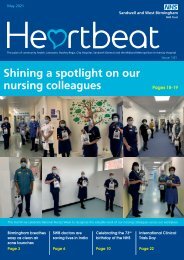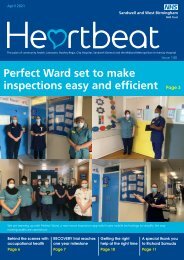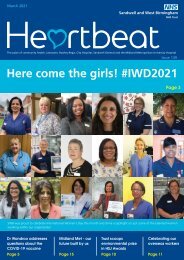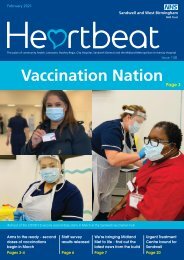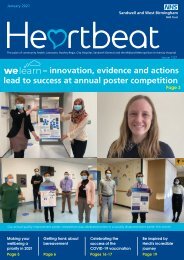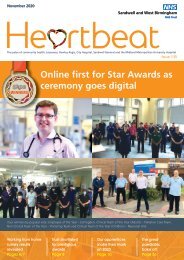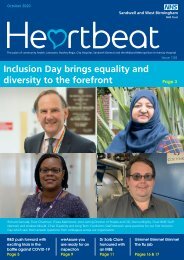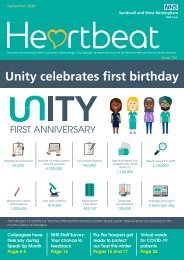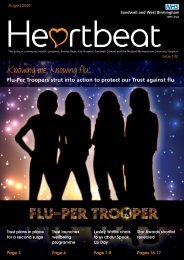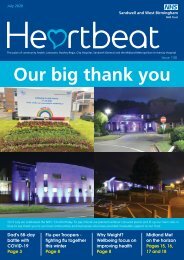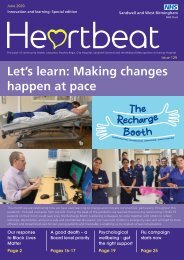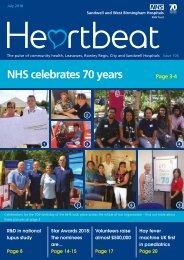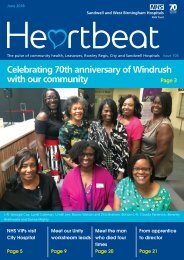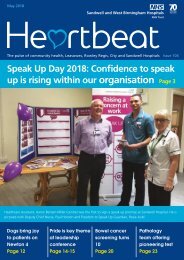Heartbeat January 2019
Create successful ePaper yourself
Turn your PDF publications into a flip-book with our unique Google optimized e-Paper software.
Toby writes about…<br />
employment and learning<br />
TobyLewis_SWBH<br />
TOBY’S LAST WORD<br />
One of the proudest moments of my time<br />
as your chief executive has been involving<br />
myself, just a little, in the work we do to try<br />
and create employment opportunities locally.<br />
That endeavour is what this column is about.<br />
But starting at the beginning, what matters<br />
to improving health?<br />
What you do, what we do with partner GPs<br />
like Manir, Imran and James (who feature<br />
in <strong>Heartbeat</strong> this month) what is done by<br />
our colleagues in RAID, the Oak Suite and<br />
CAMHS is hugely important. But if we want<br />
to change the health outcomes and the<br />
wellbeing of families and communities, we<br />
know that healthcare is at best a third of the<br />
programme. The other two parts are housing<br />
and employment. Together they provide the<br />
security to live and the basis for fulfilment.<br />
That belief in housing, employment and care<br />
as a three part mission is what animates our<br />
local Healthy Lives Partnership. And what<br />
drives the priorities that we are trying to set<br />
alongside primary care network colleagues<br />
in the local system. The NHS Long Term Plan<br />
is an important and interesting document.<br />
We all know it needs a social care green<br />
paper and an NHS workforce plan to make<br />
it truly credible, but to change outcomes,<br />
we need to tackle housing poverty and<br />
income inequality. The plan is not as brave<br />
as it could be in that respect.<br />
So we have our now longstanding projects<br />
focused on homeless young people and<br />
care leavers, which work to create dedicated<br />
apprenticeships to support those most at<br />
risk of falling through a social safety net.<br />
I want to thank line managers who have<br />
worked to support these young people, as<br />
well as our Learning Works and learning and<br />
development teams. We continue to see<br />
those projects thrive, and we are investing<br />
more right now to expand them further. We<br />
have next step options around employment<br />
access projects for ex-service people, often at<br />
risk of homelessness and exclusion, projects<br />
for those who have had mental health<br />
issues, or still have mental health issues, and<br />
work too to ease a path to employment for<br />
local people with learning disabilities (led by<br />
colleagues in our theatre teams). Every step<br />
we take in these projects changes the cost<br />
to the health service of those we assist, and<br />
may too impact on the health and wellbeing<br />
of their loved ones and dependents. The<br />
cost of social exclusion and of poverty<br />
is one paid over the long term, and<br />
which we want to tackle with up-front<br />
investment.<br />
In terms of housing, our current focus is on<br />
the Infirmary Wharf development which<br />
will take shape at City Hospital when we<br />
move out, and provide over 800 homes for<br />
local people. Meanwhile, whilst the Hallam<br />
building at Sandwell is doing a job for us<br />
accommodating many colleagues, after<br />
2023 we want it to be replaced by a housing<br />
project and are working with partners to<br />
secure that deal, which could add another<br />
100 or more dwellings to the local area.<br />
Across the country you can see NHS land<br />
laid idle, for want of the vision to turn it into<br />
homes that are needed. Around Midland<br />
Met we are leading work to create the<br />
development vision which will see not<br />
only key worker housing, but a thriving<br />
community with economic activity<br />
established. This is our business, because<br />
health depends on it. We are not just a<br />
disease service.<br />
In 2018 we were one of only two Trusts<br />
in the Midlands to achieve the whole 2.3<br />
per cent apprenticeship target set by the<br />
Government. That is a massive tribute<br />
to work by first line managers across<br />
our organisation. It means over 160<br />
apprentices in our midst. 13 colleagues<br />
are our first to achieve the healthcare<br />
support worker apprenticeship standard,<br />
and three gained distinctions in their studies.<br />
Right now we have 25 colleagues on the<br />
new team leader apprenticeship programme<br />
at level 3. And later this year our first nurse<br />
apprentice roles will graduate, and we are<br />
working hard to be ready for the same<br />
programme in midwifery.<br />
What lies behind that drive is a desire to<br />
help shape careers not simply to recruit<br />
to jobs. Last spring we tried to launch our<br />
nurse escalator project. It relaunches this<br />
month. Later this winter, we will kick off<br />
work to formally create an escalator from<br />
band 2 to band 3 for HCAs. If you have not<br />
already joined up the dots we will have a<br />
programme from band 2 to 3, via the new<br />
band 4 role, and then one from band 5<br />
to 6. We want to help high potential<br />
people locally to move into registered<br />
roles, and to progress their studies<br />
and their ambition as far as they<br />
want to go. Just as our director of<br />
therapies started many years ago in an<br />
apprentice role, there is no reason that a<br />
future chief nurse could not start work<br />
here as a HCA. To do that of course we<br />
need to make some changes to how we<br />
budget and manage jobs. That is why our<br />
PDR changes were so important, and we<br />
redo all our appraisals between April and<br />
June <strong>2019</strong>. That process spots the high<br />
potential colleagues in our midst and<br />
looks to speed up their careers and match<br />
their ambition: Assuming of course you<br />
have done your mandatory training (see<br />
the letter with your payslip in <strong>January</strong>).<br />
If you are reading this and want to<br />
know more about the opportunities,<br />
talk to your line manager, get in touch<br />
with Bethan Downing, or contact me<br />
direct. The only ring-fenced protected<br />
budget in our Trust is the training<br />
budget and it will expand yet<br />
again in <strong>2019</strong>-20. Our commitment to<br />
employment and to creating rewarding<br />
careers based in learning is one of<br />
the things that is distinctive about our<br />
organisation, one of the opportunities<br />
we will share as new partners like our<br />
GP colleagues join the SWBH family,<br />
and something that is a basis for asking<br />
people to work with and for us.<br />
Learning though is not just about careers<br />
or employment. It is also about how we<br />
share knowledge inside the Trust. Right<br />
now we are consulting on the welearn<br />
programme, which will be a big part of<br />
our <strong>2019</strong> efforts to share glimpses of<br />
brilliance from across the organisation<br />
and to make sure that we learn lessons<br />
when things nearly or do go wrong.<br />
Make sure in your February face to face<br />
team meeting you put forward your<br />
response to the TeamTalk topic and have<br />
your voice heard. If in February there is no<br />
team meeting where you work, do let me<br />
know, or contact Ruth Wilkin, and we will<br />
help you to have one!<br />
27




